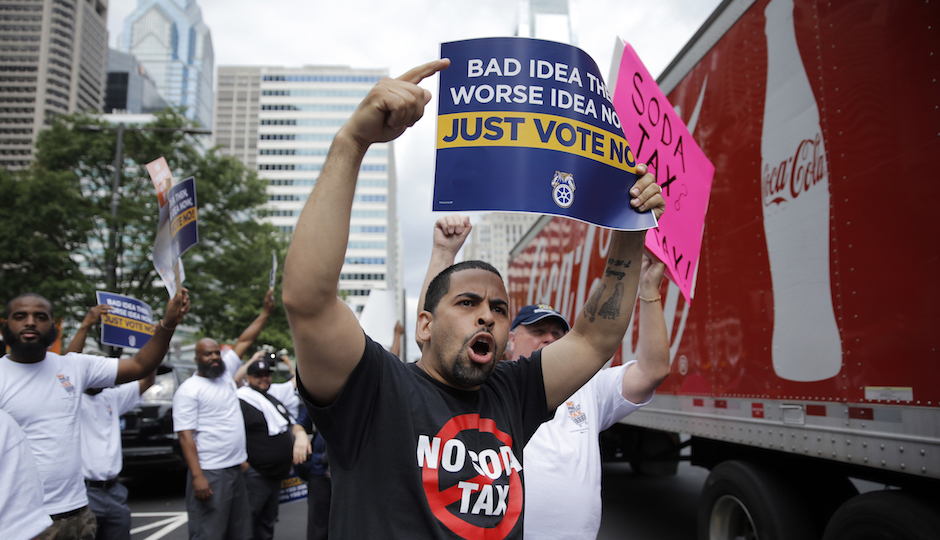The Beverage Lobby Spent $10.6 Million to Kill the Soda Tax — and Failed

The Teamsters and other opponents of the soda tax rallied outside City Hall on June 8th. | Photo by Matt Rourke/AP
When Philadelphia City Council debated Mayor Jim Kenney’s proposed soda tax earlier this year, the beverage industry outspent supporters of the tax 5-to-1 on lobbying.
The American Beverage Association shelled out $10.6 million in 2016 to try to persuade lawmakers and members of the public to oppose the tax, according to lobbying reports released today and in April. The Coca-Cola Company spent $50,000. Philadelphians for a Fair Future, a pro-soda tax group founded by allies of Kenney, forked over $2.2 million. The American Heart Association spent an additional $334,000 in support of the tax.
Both sides of the fight paid for TV advertisements, phone banks, and organizing. In the end, the soda lobby’s deeper pockets weren’t enough to stop the tax, though: Council passed an historic 1.5-cents-per-ounce tax on sugary drinks and diet soda on June 16th.
Anthony Campisi, a spokesman for the American Beverage Association, defended the group’s spending: “Because of our efforts, local grocers, retailers, restaurants, organized labor and citizens learned the truth about the regressive and discriminatory tax proposal. Armed with the facts, their opposition to the tax rose significantly. By the time City Council voted on the tax, nearly 60 percent of Philadelphians opposed it.”
When Council was weighing the soda tax, it wasn’t clear whether Philadelphians for a Fair Future would disclose all the names of its donors as well as the amount of money they contributed to the cause. The organization, which is a 501c(4), only needed to name donors who gave more than 10 percent of the total funding it received between April and June. In May, Philadelphians for a Fair Future spokesman Kevin Feeley told Philadelphia magazine that the group would “make any necessary disclosures about donors as the rules require” — but did not say whether it would reveal any more information than the law mandated when its lobbying reports were due on July 30th.
After Committee of Seventy and this magazine raised questions about the organization’s lack of transparency, Feeley said Philadelphians for a Fair Future would release the names of all its donors, including those who gave less than 10 percent. He did not answer questions about whether the group would say how much funding each donor provided, however.
Today, Philadelphians for a Fair Future did a good thing: It revealed both the names of its donors and the amount of money each one gave.
501c(4)s, which are better known as dark-money nonprofits, are likely to become more prevalent in policy battles in the future. Kenney helped raise money for Philadelphians for a Fair Future during the soda tax debate, and he said he may rely on the group to help him in future fights. New York Mayor Bill de Blasio, Michigan Gov. Rick Snyder, and New Jersey Gov. Chris Christie have all utilized 501c(4)s. These organizations give special interests another way to attempt to influence elected officials — and there are no limits to how much they can donate to these groups.
Some of Philadelphians for a Fair Future’s funders are pretty interesting. Kenney’s PAC gave $50,000. The New Jersey-based Northeast Regional Council of Carpenters, which has ties to all-powerful political boss George Norcross and helped fund a pro-Kenney super PAC in the 2015 mayoral race, gave $15,000. The American Federation of Teachers forked over $50,000.
Here’s the full list, first reported by NewsWorks:
- 1484 Brockett Road Associates, LLC: $25,000
- Action Now Initiative: $400,000
- Allison Fumo Bassman: $250
- American Federation of Teachers, AFL-CIO: $50,000
- Callowhill Center Associates: $500
- Centra Associates: $1,000
- David Seltzer: $250
- Dilworth Paxson: $5,000
- Domus: $1,000
- Gaetan John Alfano: $500
- Gannett Fleming Companies: $5,000
- Julia Erickson: $100
- Kenney 2015: $50,000
- Leonidas Savas Addimando: $2,000
- Lomax Real Estate, LP: $1,000
- Mel Heifetz: $5,000
- Michael Bloomberg: $1,635,000
- Noam Kugelmass: $100
- Northeast Regional Council of Carpenters: $15,000
- Orens Brothers Real Estate: $1,000
- Pietragallo Gordon Alfano Bosick & Raspanti, LLP: $500
- Russell Howard Harris: $500
- Sandy Sheller: $1,000
- Shelly Electric Company: $100
Follow @HollyOtterbein on Twitter.